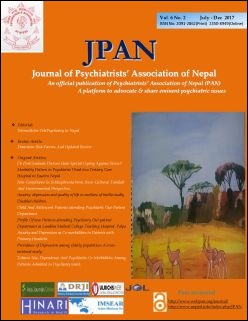Anxiety, depression and quality of life in mothers of intellectually disabled children
DOI:
https://doi.org/10.3126/jpan.v6i2.21757Keywords:
Anxiety, Depression, WHOQOL BREF, Intellectual DisabilityAbstract
Introduction: Studies have shown that there is an association between Anxiety, Depression in mothers of children having Intellectual disability with poor quality of life (QOL) in mothers of such children. This study was carried with the objectives to describe the clinico-socio-demographic profile of mothers of intellectually disabled children and to investigate the relationship among anxiety and depression with quality of life in mothers with intellectually disabled children.
Material And Method: Mothers (N=31), whose children's IQ score was below 70, were enrolled in to the study with their informed consent. Depression and Anxiety disorders were diagnosed as per ICD 10. Severity of depression was measured with BDI and Anxiety symptoms with STAI. WHOQOL-BREF was used to assess Quality of life. The relationship among anxiety, depression and QOL were analysed using diagonal matrix, ANOVA and Pearson correlation test.
Results: The mean age of participants was 50.23 (S.D= 6.11), BDI score was 13.65(S.D= 11.301), STAI score was 53.90 (SD= 15.821), WHOQOL- BREF in all four domains was 290.90 (S.D=49.42). There was significant correlation between BDI and STAI (P=0.01, r:0.651 ) and the three domains of WHOQOL- BREF(P=0.01, r:0.821, 0.843, 0.635 respectively) scale except Environment domain. Among the participants, 48.4% (ICD 10) had depression of varying degree along with 54.8% depression as per BDI cut off score. Anxiety disorder was seen in 22.6% as per ICD 10 but as per STAI it was 53.90(SD=15.821) which was statistically significant (p:0.01, r: -0.507). Depression when compared with no diagnosis persons has poor quality of life in WHOQOL-BREF physical domain (p:0.002) but with compared to Anxiety or both it was not statistically significant.
Conclusion: The findings of this study revealed that mothers of children having Intellectual disability have high level of Anxiety and Depression which indeed had impact in quality of life.
J Psychiatrists’ Association of Nepal Vol. 6, No. 2, 2017 Page: 28-35
Downloads
Downloads
Published
How to Cite
Issue
Section
License
This license enables reusers to distribute, remix, adapt, and build upon the material in any medium or format, so long as attribution is given to the creator. The license allows for commercial use.




